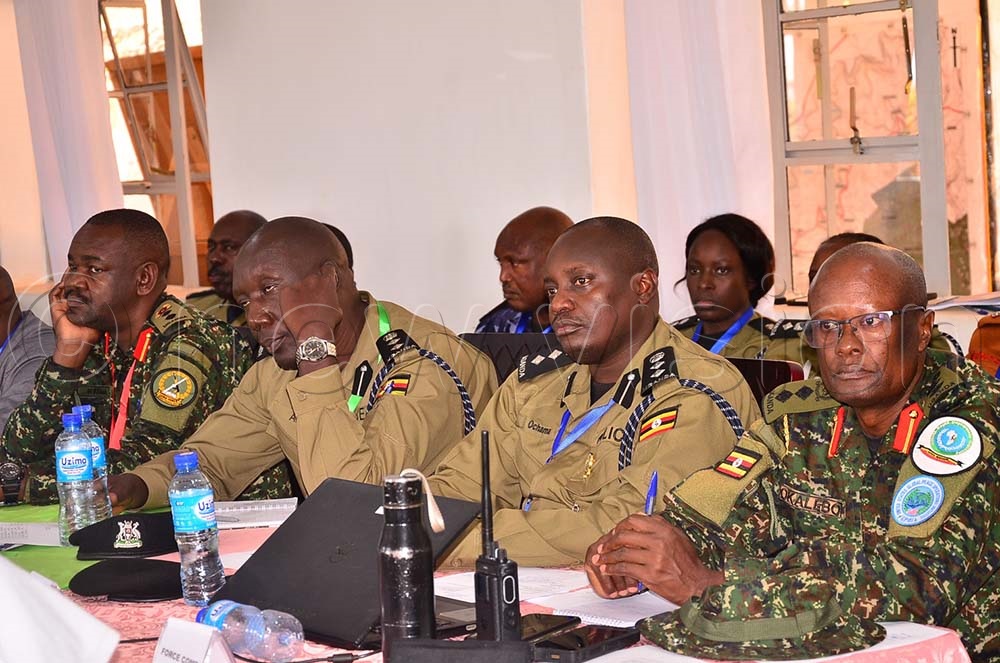Uganda strengthens disaster response, management capacity
“Medics are very important during disasters, and URCS possesses this discipline, which we cherish,” Kabona said.
Nabasa (seated 6th right) with senior security officers and participants at the ongoing disaster response and management training at URDC in Jinja on Tuesday. (Credit: Jackie Nambogga)
Uganda has held its second disaster response and management series, in which key stakeholders evaluated and examined the country’s readiness towards mitigating catastrophes on time.
The 10-day Command Post Exercise (CPX) 25, dubbed Okoa Maisha, a Swahili word literally meaning "save lives," started on August 24, 2025, at the headquarters of the Uganda Rapid Deployment Capability (URDC) at Gadafi Military Barracks in Jinja City.
Officiating at the opening of the exercise, Maj. Gen. Don Nabasa, the Uganda People’s Defence Forces (UPDF) Joint Staff policy and strategist, said disasters were quite often and likely to continue occurring.
According to Maj. Charles Kabona, the public information officer of UPDF's 1st Infantry Division, some disasters are geological, natural, or manmade, which require a timely response to save lives and properties.
Therefore, Nabasa said this was a very critical requirement for Uganda to prepare thoroughly whenever it is faced with disasters.
Running under the theme, strengthening multi-sectoral resilience and local action on sustainable disaster response and management through integrated leadership and command, the event attracted participants from the Office of the Prime Minister (OPM), the lead entity in responding to disasters.
Others were from the URDC command and staff, UPDF, Police, prisons and government ministries, departments and agencies (MDAs) at the internal affairs, including the works and transport, including the Uganda Red Cross Society and the Bulambuli district local government.
Kabona explained how all the participants had vast experience in disaster management, citing those from URCS who, he said, have a medical background.
“Medics are very important during disasters, and URCS possesses this discipline, which we cherish,” Kabona said.
Meanwhile, Nabasa said the simulation-based training was anticipated to foster URDC’s capability to coordinate with the UPDF formations, MDA’s, local governments, and humanitarian organisations by facilitating timely responses, establishing robust communication, collaboration, coordination, decision-making process, and early detection measures to enhance intrepidity.
Since the training focuses on creating a platform for strengthening a partnership, signage required during response to disasters, Nabasa implored participants to share their expertise by identifying the gaps and weaknesses in the existing disaster response systems, and by working out solutions for future disasters.
Participants at the ongoing training exercise on disaster response and management at the URDC in Jinja city on Tuesday. (Credit: Jackie Nambogga)
Response mechanisms
He said the outbreaks underscore a collaborative, local, and sustainable nature of modern disaster response mechanisms.
Therefore, Nabasa said URDC’s focus was to be integrated into Uganda’s disaster management mechanism supervised by the OPM as a multidimensional rapid response formation.
“I have no doubt whatsoever, this will enhance coordination, communication, and decision-making across staff sections and units, respectively,” he stated.
Similarly, Brig. Gen. Ernest Nuwagaba, the URDC commander, said they intend to achieve their collective objective to validate and integrate the URDC disaster response capabilities into the OPM national emergency co-ordination and operation centre (NACOC).
He said the integration was a vital step towards establishing a cohesive national disaster management under a united mission towards building a resilient framework for preparedness and response.
The exercise, which focuses on managing realistic disaster scenarios like floods, landslides, and other pandemics, provided a critical platform to refine systems, foster trust, and reinforce coordination in ensuring their leadership and readiness during and after crises.
Consequences of failing to prepare
On the other hand, Kabona said failure to prepare without manpower and machines leads to loss of lives and property, but with such joint training exercises, it reflects where to start from.
Meanwhile, Nuwagaba, who is also the exercise director, said the training’s primary goal was to enhance preparedness, refine response strategies, and spot gaps under time-constrained and high-pressure conditions.
“Preparedness is the come before, during, and after the storm; it is a sustained state of readiness that carries us through every phase of crisis,” he noted.
He outlined the exercise’s objectives of engaging players in the integrated planning, command, control, and execution of disaster management operations.
It also aims at developing staff competencies, strengthening coordination protocols among stakeholders, as well as assessing URDC’s readiness to respond to disaster incidents.
Present at the opening ceremony were attended by senior army officers such as Brig. Gen. Flavia Byekwaso, the URDC chief of staff, and prison spokesperson Frank Baine, among others.